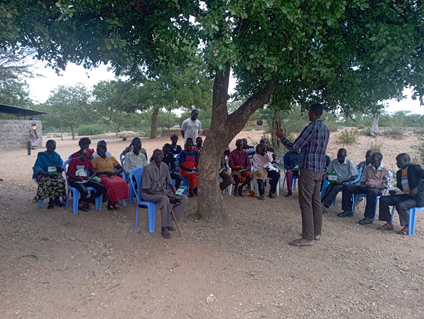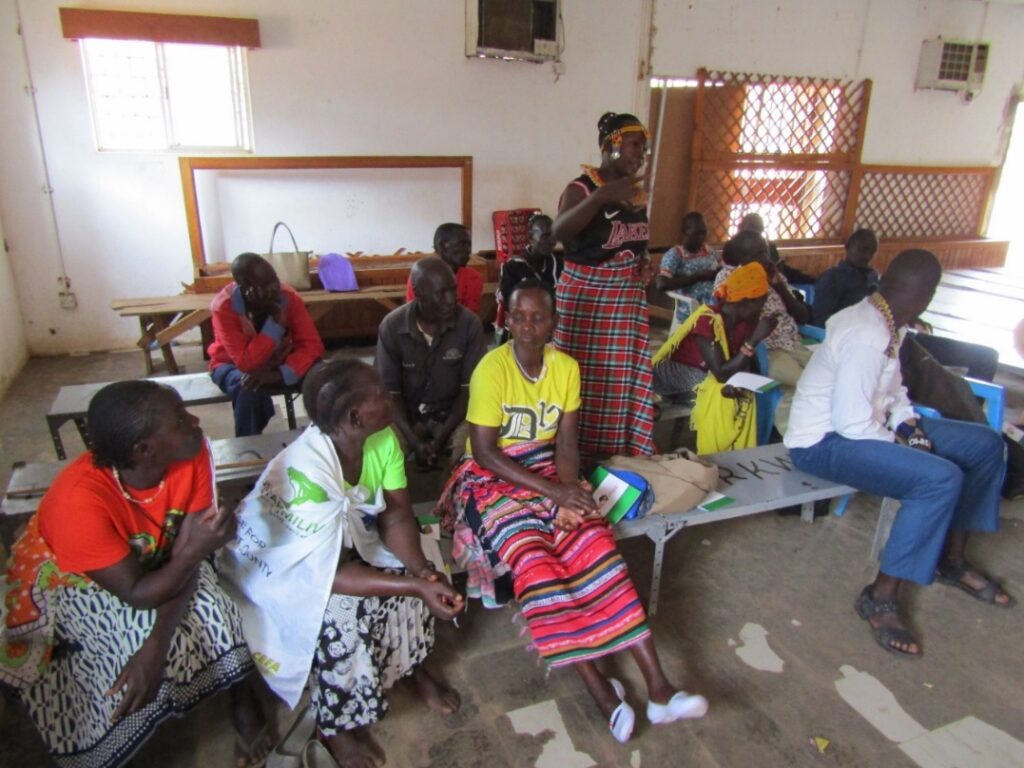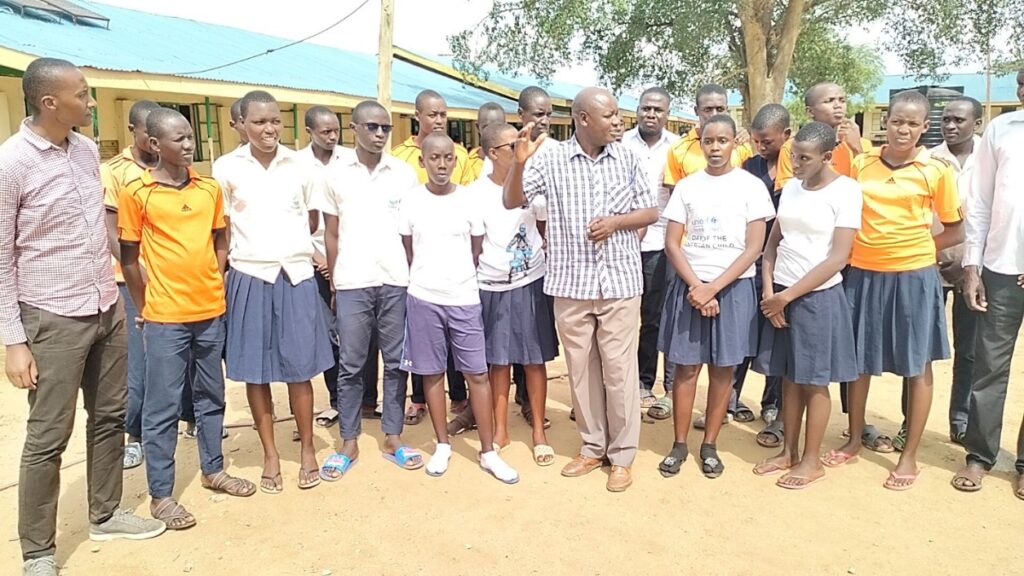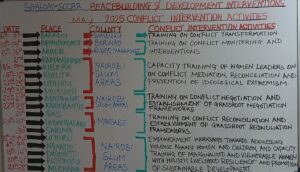By: Austin Ngacha MA, Francis Mwangi MA, & Moses Osiro MA.
Turkana and West-Pokot Counties in Kenya, share a borderline where communities have suffered gravely from persistent violent inter-ethnic conflict. Both Turkana and Pokot communities along the borderline are predominantly pastoralists with a few practising subsistence farming along the Marmate River. In Patrick Devine’s doctoral thesis: “Persistent Conflict between the Pokot and The Turkana: Causes and Policy Implications,” Devine (2016) provided clarity on the overlap and distinctions between the causes of conflict and why conflict persists. One of his key contributions centered on demonstrating how this conflict persisted because of inappropriate interventions from different actors including the government, faith-based institutions and some non-governmental organizations.
Currently, there is an upsurge in conflict linked to persistent drought and famine that is dreadfully affecting the pastoralist communities. Shalom is in constant contact with its trained community animators who are active on the ground in seeking community-based solutions to this violent behaviour. Our interventions, from the bottom up, entail constructive change efforts that include and go beyond the resolution of specific problems fostering personal, relational, structural and cultural conflict.

Shalom-SCCRR interventions along this borderline are focused on addressing the root causes of manifest and structural violence, affecting the two ethnic communities. The deep rooted inter-ethnic animosity has left many dead, others displaced and, livelihoods destroyed. Devine (2016), provided valuable insights on how critical underlying structures of a society influence an individual’s attitude, decision-making and behavior, which consequently determine an individual’s relationship with others; in this case the ethnic others, hence being a major driver of conflict.
Mr. James Kisike, a Shalom-SCCRR Trained Community Resource Person and the group Animator, recognizes the transformative interventions of our work:
“We are grateful for the knowledge and skills that Shalom-SCCRR continues to impart on the two conflicting communities. Through the intensive training workshops, our capacity has immensely developed and we can more and more understand the root causes of this persistent inter-ethnic violent conflict. Presently, the Shalom-SCCRR trained Community Resource Persons are engaging both communities in peacebuilding activities.”

Acknowledging that conflict is a common occurrence in human relationships, and that conflict is a major catalyst of change, Shalom-SCCRR has employed Conflict Transformation as an intervention strategy to help address conflict between Pokot and Turkana communities. The adoption of this strategy is based on the three paradigms of conflict analysis which provide lenses through which conflict causes can be identified and examined. The Strategist, Peace Research and Conflict Research paradigms provide the basis upon which strategic intervention approaches can be adopted to effectively address the diverse causes of conflict. This is also a big boost to the government presence in the region because it seeks to create acceptance and awareness in the community that they can resolve their difference peacefully.
Shalom-SCCRR conducted 22 training workshops in 2022, for purposes of providing analytical skills and peacebuilding techniques which are essential in conflict transformation and reconciliation, impacting more than 578 local peace actors: opinion shapers, traditional leaders, local administrators, religious leaders, women and youth leaders etc. Active community participation is always at the center of Shalom-SCCRR conflict intervention designs. Involving grassroots communities enhances learning and ensures local ownership and sustainability of the conflict interventions. Empowering community members with conflict analysis and transformation skills, and guiding them in solution finding.
In addition to conflict interventions, we have committed support to schools/ educational development and transformation in some of the most marginalized and remote areas. Schools and institutions along the Kainuk and Turkwel Gorge areas have received enormous Shalom-SCCRR educational and infrastructural support.
To date, Shalom-SCCRR has implemented over 607 school/educational development projects, a significant contribution to the educational transformation of communities that have been marginalized for years from the mainstream development – social, economic, political, and structural.

Mr. Elijah Obachi, the head teacher at Turkwel Gorge Mixed Secondary School in West Pokot County, appreciates Shalom-SCCRR’s school/educational and infrastructural contribution to the school. He stated, “We stand here today as a school with confidence and full of hope because of the generosity and selflessness of Shalom-SCCRR’s donors. Thanks to Shalom’s interventions and funding, we have classrooms, boarding facilities, teaching and learning materials – all provided and facilitated by Shalom-SCCRR. We acknowledge Shalom-SCCRR’s efforts and commitment to conflict transformation and peacebuilding interventions with our communities rallying them to embrace peaceful coexistence along the borderline. … We are forever grateful!”
Shalom-SCCRR Community-based interventions are always data driven, based on empirical research methodology and qualitative approaches to enhance understanding attitudes and behaviors that sustain conflict. Every research exercise is conducted to the highest academic standards and rigor. The findings are the authoritative voice of the people. In these areas, we have trained conflict and peace monitors who support the Shalom Conflict Monitoring and Intervention Mechanism (SCMI) through conflict incident reporting on a weekly and monthly basis. The reports are then verified by the engaged peace groups, local administrators and security actors, leading to timely interventions.
Devine, P., (2016). Persistent Conflict between the Pokot and the Turkana: Causes and Policy Implications [Unpublished Ph.D. Thesis]. University of Nairobi, Kenya. http://erepository.uonbi.ac.ke/handle/11295/97476
Authors:
Austin Ngacha MA, Shalom-SCCRR Project Officer
Francis Mwangi MA, Shalom-SCCRR Monitoring, Evaluation, Research and Learning Officer
Moses Osiro MA, Shalom-SCCRR Project Assistant
Relevant Links:
- 2022 Shalom-SCCRR Results and Achievements. https://shalomconflictcenter.org/2022-shalom-sccrr-results-and-achievements-2/
- Shalom-SCCRR. (2023). Shalom-SCCRR 2022 Conflict Transformation and Peacebuilding Results & Achievements. https://shalomconflictcenter.org/2022-shalom-sccrr-conflict-transformation-peacebuilding-results-and-achievements/
- Shalom-SCCRR. (2023). 2022 Shalom-SCCRR School/ Educational Development Projects Results and Achievements. https://shalomconflictcenter.org/2022-shalom-sccrr-school-educational-development-projects-results-and-achievements/
- Devine, P. R. (2022). Conflict Transformation and Peace-Building across Eastern Africa: Chairman’s Report on Progress in 2021. https://shalomconflictcenter.org/conflict-transformation-and-peace-building-across-eastern-africa-chairmans-report-on-progress-in-2021/
- Shalom-SCCRR. (2022). Prof. Wanakayi K. Omoka’s Understanding of the Philosophy and Work of Shalom-SCCRR Recollected; Augmented with 2022 Results by the Dept. of Monitoring, Evaluation, Research, and Learning (MERL). https://shalomconflictcenter.org/recalling-prof-wanakayi-k-omoka-phd-understanding-of-the-philosophy-and-work-of-shalom-sccrr-augmented-with-2022-shalom-sccrrs-achievements-and-results/
- Okoth, G. (2023). Shalom-SCCRR’s Data-Driven Peacebuilding Methodology: Progress in Mainstreaming Research as the basis for Communities’ Collective Action in Conflict Transformation and Peacebuilding. https://shalomconflictcenter.org/shalom-sccrrs-data-driven-peacebuilding-methodology/
- Shalom – SCCRR. (2021). Devine, P. R. PhD: History of the Conflict between the Pokot and the Turkana in Space and Time: Causes and Policy Implications. https://shalomconflictcenter.org/devine-p-r-phd-history-of-the-conflict-between-the-pokot-and-the-turkana-in-space-and-time-causes-and-policy-implications/
- Shalom’s Educational Intervention in Turkwel Gorge, West Pokot County. https://shalomconflictcenter.org/shaloms-educational-intervention-in-turkwel-gorge-west-pokot-county/

